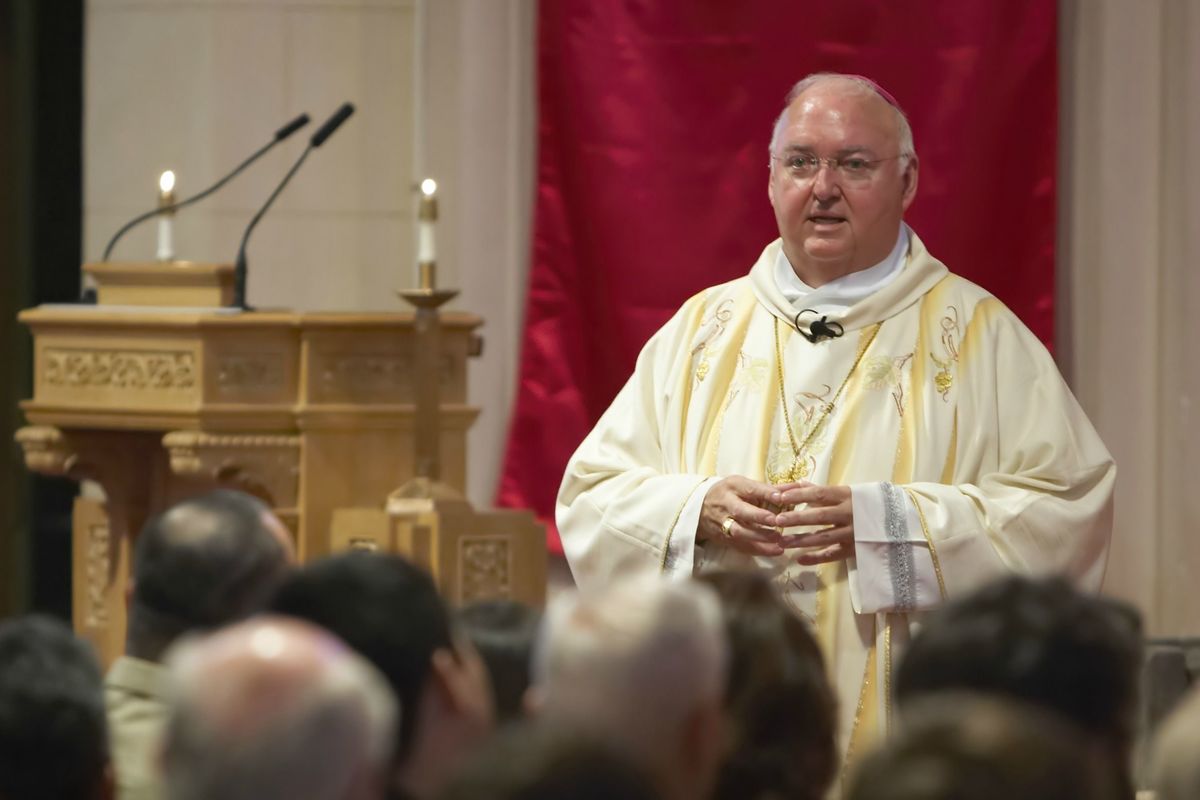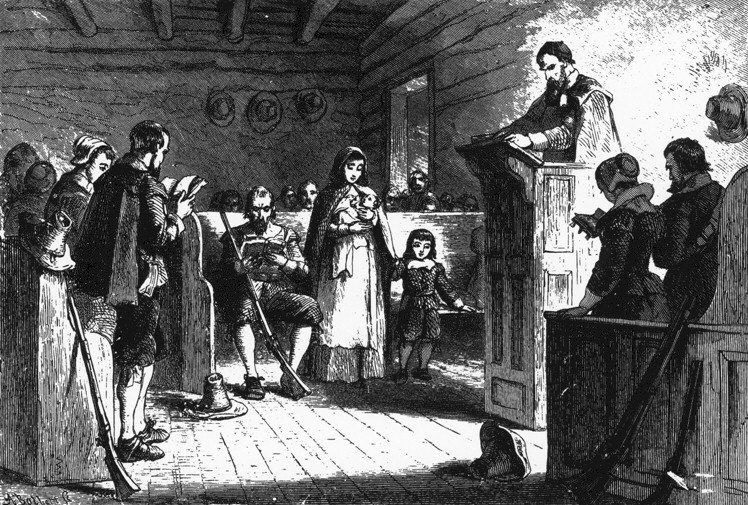The Biblical Background of Preaching – Donald G. Miller

What does it mean “to preach”? Is one of the definitions given in Webster’s New International Dictionary (2nd ed., unabridged, 1947), which has wide current acceptance, an adequate one: “to discourse publicly on a religious subject”? If so, then the ideas of a speaker on a given religious theme, set forth to an audience of listeners, would constitute a sermon. In this case, a sermon could be preached with no reference to the Bible or to God’s saving action in Jesus Christ. Or, if God in Christ were mentioned, he could well be the object of man’s thought about him rather than the subject of the truth presented. A sermon would be speech about God rather than God himself speaking. It would be human speculation about the divine rather than the divine disclosing himself to man.
-
PREACHING IS DECLARING GOD’S WORD AS RECORDED IN THE BIBLE
A careful examination of preaching in the Bible indicates that it centers not in human ideas about God but in what God has done for man; that it must therefore be derived from the Scriptures, which are the record of what God has done for man, rather than from human speculation; and that it is authoritative because it is God himself speaking through his servant, the preacher, so that the preached word actually becomes the Word of God. As it is stated in The Second Helvetic Confession of 1566, Chapter I, “when this Word of God is now preached in the Church by preachers lawfully called, we believe that the very Word of God is preached” (italics added).
That true preaching is God’s Word to man rather than man’s word about God is to be seen in various Biblical descriptions of the nature of preaching. False prophets spoke a word of their own which was worthless because, said God, “I did not send them, nor did I command them or speak to them” (Jer. 14:14). On the other hand, the true prophet was sometimes the bearer of a word which ran so counter to his own thought that he would rather not have been born than to speak it (Jer. 20:14ff.). Yet he was overpowered (Jer. 20:7) by the Almighty who insisted, “I have put my words in your mouth” (Jer 1:9). He was called to say to his people, “Thus says the Lord God” (Ezek. 2:4). It is plain, then, that God was the subject of prophetic speech more than its object. The prophets were not so much speaking about God as they were men through whom God himself spoke.
The writer to the Hebrews insists that the same God who spoke through the prophets spoke the same word through his Son Jesus Christ (Heb. 1:1). Although in him God’s word which was before partial and metaphorical is now total and real, the nature of the word remains constant. Jesus was less one who spoke about God than he was one in whom God himself spoke. In fact, the writer of the Acts goes so far as to call God a preacher, “God … sent to Israel, preaching good news of peace by Jesus Christ” (Acts 10:34ff.). Christ was a word spoken by God rather than about him.
The apostles who recounted to others this word God had spoken in his Son, however, declared that their word to men was no less a direct word of God than that which was spoken through the prophets and through Jesus Christ. Paul wrote to the Corinthian believers, “So we are ambassadors for Christ, God making his appeal through us” (2 Cor. 5:20).
God was not the object of Paul’s thought but the subject who spoke through Paul. Paul’s was an ambassadorial word which conveyed the thought and carried the authority of the one who sent him as surely as though that one himself were speaking. Paul reiterates this conviction in unmistakable terms to his Thessalonian readers, “when you received the word of God which you heard from us, you accepted it not as the word of men but as what it really is, the word of God, which is at work in you believers” (1 Thess. 2:13). The word which God spoke through prophets, apostles, and Jesus Christ is the expression of himself through them. This word is recorded in the Bible.
The Bible, then, becomes the preacher’s charter. It is as the Bible is preached that God’s Word is preached. It is not the preacher’s skill in speaking, nor his own observations on life, nor his own religious thoughts, nor his own powers of persuasion which make a sermon a sermon. It is only when the preacher becomes the contemporary instrument through which the ancient word of prophet, or apostle, or Jesus speaks, that a sermon is a sermon. Preaching, said P. T. Forsyth, “is the Gospel prolonging and declaring itself.… It is an eternal, perennial act of God in Christ, repeating itself within each declaration of it” (Positive Preaching and the Modern Mind, New York: Eaton & Mains, p. 5f.). It is only when the living God, who himself spoke in the history recorded in the Bible, speaks again through the preaching of the Bible that a sermon becomes a sermon. Otherwise, it is a speech or an address on a religious topic; the speech of a man about God, not God speaking of himself to man.
The nature of Christianity as a historical religion underlies this fact. The term “historical religion” in this sense does not mean merely a religion with a history, the development of which historians can objectively study. This would be true of any extant religion. It means rather that Christianity consists supremely in a series of unique events in which the Christian believes God acted uniquely for the salvation of the world. Christianity is a witness to something done. It consists primarily in events, and what flows from them. It does not move first and foremost in the realm of religious ideas. It is not primarily a theology, nor a philosophy, nor a way of life. Although theology, philosophy, and ethics may and, indeed, should be developed from it, these are accompaniments rather than constituents of the faith. Christianity consists in a series of historic events which took place over a span of centuries from Adam to the Christ. All the events in the series were leading up to and consummated by the final event in Christ. If God was active in the whole series of events, and if he acted uniquely in the final event, then Christianity is made true by happening. It is not something created by human reflection or religious genius.
This means that the proclamation and promulgation of the Christian faith must ever arise out of the continued rehearsal of the events recorded in the Bible. The word “remember” is characteristic both of the Old Testament and the New (see Deut. 7:18ff., 8:2ff., 18ff., Luke 24:8; 1 Cor. 11:25; 2 Tim. 2:8f.). Remembrance, in the Biblical sense, is not merely psychological recall. It is, rather, the reconstituting of the realities involved in the past event and involving oneself in those realities by identification with what they represent. The question of the Negro spiritual, “Were you there when they crucified my Lord?” captures the Biblical quality of “remembrance.” Do you know that you were involved in that past event? And do you now identify yourself both with the judgment and the grace which flow from the past event into the present moment? The command, therefore, “remember Jesus Christ” (2 Tim. 2:8), or “drink it in remembrance of me” (1 Cor. 11:25), involves identification with God’s saving act in Christ by believing it and by taking action appropriate to it. “Remember Pearl Harbor” means more than a date. It means identity with a nation both past and future, emotional involvement in its welfare, a sense of implication in its destiny. So it is with “remembrance” of the Biblical events. Hence, to preach is to “remember” the whole series of events begun with Adam and climaxed in Jesus Christ, so that they are reconstituted as present realities in which our destiny depends. I have stated it elsewhere: “The Bible is the unique record of the unique Act which creates, sustains, and controls the life of the church, and is as final and unrepeatable as that Act because it is really a part of the Act. If, then, preaching is to reproduce the effects of that Act in human lives now, it can normally do this only by so rooting itself in the Bible that the Deed there recorded is transfigured into living reality now” (Fire In Thy Mouth, New York: The Abingdon Press, p. 61).
-
FORMATION OF THE CANON
The historic justification for this is the church’s formation of the canon. By sifting the many written documents which circulated in the early Christian decades and by finally setting up certain ones as authoritative over the life of the developing community, the early church was indicating that the faith witnessed to in these Christian books was that by which its own life had been created and nurtured, and by which all future developing tradition in the church was to be measured.
Four aspects of the formation of the canon should be noted. First, although the Bible came out of the life of the church and the canon was finally established by the decision of the church, it was not the church which gave to these books their authority. It is one thing to impart authority, it is another to recognize it. The canon is not authoritative. because the church said it was. The church said it was authoritative because it contained the gospel which they recognized as authoritative, the authority of which they gladly accepted.
Second, the canon was formed through long process. The final formation of it by church councils was but the official recognition of what the life of the worshiping community had accomplished by the use of these books. Councils of men are quite fallible. Had the canon been set up deliberately by one such council called for that purpose, the possibility of a wide margin of error would have been strong. These works, however, circulated widely throughout the worshiping community in all parts of the Roman empire, and were used in the worship and instruction of the whole church. Those which spoke authoritatively to the life of the church rose to the top like cream, while the others were discarded. The councils later merely gave official recognition to what the consciousness of the worshiping community had already done. By this process the likelihood of major error was greatly reduced.
Third, although the Bible came out of the life of the church, in a deeper sense the church did not create the canon. Historical priority is one thing; real priority is another. Although the community may have had a large hand in editing the books of the Bible as they now stand, most of them came from inspired individuals who were often at odds with the community. It was men such as Jeremiah, Isaiah, and Amos, not the community of Israel, who produced the Old Testament, as it was Paul and Mark and Luke and others who produced the New Testament. These men, of course, were a part of the life of the community but they often stood above the community, bringing God’s judgment to bear on it and guiding it in ways independent of the community. These works, then, are God’s gift to the church rather than the church’s achievement. Furthermore, it was the gospel, the kerygma, lying behind both the church and the Gospels, which produced them both. It was the message which the apostles preached which brought the church into being, and it was this same message which was finally put down in the Bible. The gospel was a message before it was a book. It is, therefore, the Bible’s gospel which is authoritative over the life of the church, which authority in no way derives from the church. The church did not produce the gospel: the gospel produced the church. This gospel came to the church and brought it into being. It was the “gospel God announced” to the church and confirmed “by a mighty act in that he rose from the dead” (Rom. 1:2, 4 N.E.B.). “It was declared at first by the Lord,” and then “attested … by those who heard him” (Heb. 2:3). The Bible, therefore, is authoritative simply because it contains the record of that which God brought to the church in his Son. The church put its stamp of approval on that which it recognized as the source of its life and the medium of its nurture.
Fourth, inasmuch as the major books of the canon were quickly and almost universally recognized as authoritative, while others were recognized by only a part of the church and had a difficult time getting into the canon, this suggests that not all the books of the Bible are on the same level. Luther wanted to eliminate the Epistle of James, and Calvin did not know what to do with the Book of Revelation. This attitude did not suggest any irreverence toward the Bible, but rather the recognition of the historic process by which the Bible came into being and the fact that historic processes, partly human as well as divine, may have in them a margin of error.
The reason the Reformers had difficulty with the above named books was that they did not find the gospel imbedded in them as they did in the other parts of the Bible. Since, however, the church included these, and other less valuable works, in the canon, it is perhaps better to listen for whatever Word of God the church found in them rather than to propose casting them out as did the Reformers. Nonetheless, it is plain that the authority of the canon lies in the faithfulness and depth with which the books contained in it convey the gospel to the church. For this reason, since the absolute and infallible authority of the church does not lie behind the books in the canon for the Protestant, as it does for the Roman Catholic, it has been rightly said that the problem of the canon is the “Achilles heel of Protestantism.” This means that for the Protestant the authority of the Bible is the authority of the gospel.
And the authority of the gospel has behind it the authority of Jesus Christ. And this authority must be accepted by faith. To the extent, then, that Protestantism is true to its basic premise, sola fide, it will keep its preaching centered in the Christ to whom our faith is directed. And the place where he is to be found is in the Bible. Hence, the Bible becomes the only authoritative source for authentic Christian preaching.
-
PREACHING THE WHOLE GOSPEL
Properly to preach the Bible, however, means to view the Bible as a whole and to allow it to determine the central emphases around which Christian preaching should center. The story of the Old Testament has two foci—the Exodus and the coming Messianic deliverance. The first runs like a golden thread throughout Israel’s history: “As the Lord lives who brought up the people of Israel out of the land of Egypt” (Jer. 23:7). Both worship and law, both cult and ethical instruction, are in the Old Testament consistently related to God’s deliverance of his people at the Exodus. The text of the Old Testament might well be Exodus 19:4f.: “You have seen what I did to the Egyptians, and how I bore you on eagles’ wings and brought you to myself.
Now therefore, if you will obey my voice and keep my covenant.…” But since Israel did not obey, the second refrain became necessary: “Behold, … I will make a new covenant with the house of Israel …, not like the covenant which I made … when I took them … out of the land of Egypt, my covenant which they broke, … I will put my law within them, and I will write it upon their hearts; and I will be their God, and they shall be my people” (Jer. 31:31ff.). The entire Old Testament is organized around God’s redemptive act at the Exodus and his coming redemptive act in the future.
The New Testament centers in the New Covenant established by God’s redemptive act in the death and resurrection of Jesus Christ. Approximately one-fourth of the entire gospel story is given over to Jesus’ death and resurrection. Furthermore, as Luke indicates by having Jesus’ face set toward Jerusalem long before he actually sets out for the city (9:51), the intervening teaching is all to be understood in the light of the fact that it is given by one who is on his way to Jerusalem to die. Many of the teachings of Jesus can be paralleled in the teaching of the rabbis. The unique thing about his teaching was his own Person. He was what he taught, and supremely so in his death and resurrection. This is so plain in the Acts and the Epistles that it hardly needs pointing out.
In the light of this, Christian preaching should center in God’s redeeming action set forth in both Testaments, climaxed in Jesus’ cross and resurrection. This is not to say that this is all that should be preached. It is to say, however, that this is the presupposition of all Christian preaching. Ethical instruction, light on contemporary events, guidance in worship, or whatever might be undertaken in a Christian pulpit are made Christian by their relation to Christ. And Christ is the Suffering Servant of the Old Testament, the dying and rising Lord of the New.
It is instructive to follow through with a concordance the words translated “preach” in the New Testament to examine the grammatical objects of these verbs. They are so almost unanimously related directly to the central figure of Christ that were it not for the gloriousness of this central figure the New Testament preaching would suffer from monotony. New Testament preaching consisted in the announcement that the Kingdom of God anticipated in the Old Testament has come in Jesus Christ who, in his lifetime, did many “mighty works” to manifest his Lordship over all forms of evil; who died, who was raised from the dead and made Lord of the universe, through whose Lordship salvation is offered to all men and final judgment is to be made. Beyond this, New Testament preaching called men to repentance and belief in this “good news,” and to the ethical response in their total living appropriate to the Lordship of Christ. If, therefore, the New Testament is to be our guide, these same emphases should be found in current preaching. The form in which this “good news” is cast may change, and most certainly the ethical response of our time will differ in shape from that of the first century. The form of contemporary preaching may change; its essence remains unchanged.
The same result is reached by examining the verbs in the New Testament which are translated “preach.” They reinforce the proclamation nature of preaching, its center in the events of Christ’s life, death, resurrection, ascension, and future coming. Friedrich, in Kittel’s Theologisches Wörterbuch zum Neuen Testament (Stuttgart, W. Kohlhammer, Verlag), indicates that the most frequently used New Testament word for preaching, evanggellizō, is a terminus technicus for “news of a victory.”
Originally it was used by the Greeks to announce any joyous event, but finally it came to be used more exclusively in the sense of reporting a victory on the field of battle. It was appropriately selected by the Christians to describe their preaching. It consisted mainly in the announcement of the victory of Christ over sin and death, and what that entailed for human life here and hereafter. The second most frequently used verb to describe preaching, kerussō, means “to be a herald.” The third is katanggellō, which means “to announce, declare, proclaim publicly.”
All of these verbs suggest that New Testament preaching was centered in the events which constituted God’s saving action in history, which events and the victory they achieved must be heralded from generation to generation, to the “last syllable of recorded time.”
Insofar as preaching in any age is Christian, therefore, it must be centered in the same message which formed the heart of the New Testament. It was this message which brought the church into being. It is this message which has enabled it to weather the vicissitudes of its long history. It is this message by which alone the contemporary church can be nurtured and empowered to witness to the world. The message does not originate with us. It is a “given.” The message of the Scriptures is the source and norm of the Christian faith, when quickened by the Holy Spirit. Preaching the Bible makes preaching Christian.
BIBLIOGRAPHY
Dodd, C. H., The Apostolic Preaching and Its Developments. London: Hodder & Stoughton, 1936.
Farmer, H. H., The Servant of the Word. New York: Charles Scribner’s Sons, 1942.
Forsyth, P. T., Positive Preaching and the Modern Mind. New York: Eaton & Mains, 1907.
Miller, Donald G., Fire in Thy Mouth. New York: Abingdon, 1954.
———, The Way to Biblical Preaching. New York: Abingdon, 1947.
Mounce, Robert H., The Essential Nature of New Testament Preaching. Grand Rapids: Wm. B. Eerdmans, 1960.
Ott, Heinrich, Theology and Preaching. London: Lutterworth Press, 1965.
Ritschl, Dietrich, A Theology of Proclamation. Richmond: John Knox Press, 1960.
Wingren, Gustaf, The Living Word in the Preaching and Mission of the Church. Philadelphia: Muhlenberg Press, 1960.
Miller, D. G. 1967. The Biblical Background of Preaching. In R. G. Turnbull (Ed.), Baker’s dictionary of practical theology. (R. G. Turnbull, Ed.) (1). Baker Book House: Grand Rapids, MI



